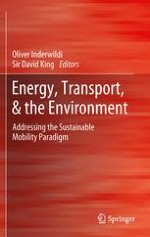2012 | OriginalPaper | Buchkapitel
Fuel Taxes, Fuel Economy of Vehicles and Costs of Conserved Energy: The Case of the European Union
verfasst von : David Bonilla
Erschienen in: Energy, Transport, & the Environment
Verlag: Springer London
Aktivieren Sie unsere intelligente Suche, um passende Fachinhalte oder Patente zu finden.
Wählen Sie Textabschnitte aus um mit Künstlicher Intelligenz passenden Patente zu finden. powered by
Markieren Sie Textabschnitte, um KI-gestützt weitere passende Inhalte zu finden. powered by
